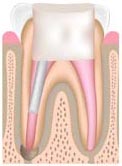
Root canal treatment (also referred to as root canal therapy or endodontic therapy) is made necessary when a cavity reaches all the way to the pulp. Regular cleanings and checkups can prevent and detect problems early, but sometimes-deep restorations or trauma to a tooth may cause the nerve to be damaged to the point it needs a root canal.
Once this occurs the pulp becomes infected, and can even extend through the root tip and begin to eat away at the surrounding bone (referred to as an abscess). Once the pulp is infected, it must be treated, as it cannot heal on its own. It can even weaken the entire immune system. This is dangerous and can be very painful. Symptoms that the pulp has become infected may include sensitivity to hot/cold or sweets, pain, swelling, pain to biting or pressure, and a bad taste in the mouth.
Root Canals to Control Infection
Sometimes, however, no symptoms are apparent and the person is unaware of any problem until a checkup. A root canal is then performed to clean out the infected tooth pulp and disinfect the canals of the tooth. The only other treatment would be to extract the tooth. Once the infection is resolved, the canal(s) are filled in to prevent any further infection. Usually a core build-up and crown is recommended for restoring a tooth that has had root canal therapy.
